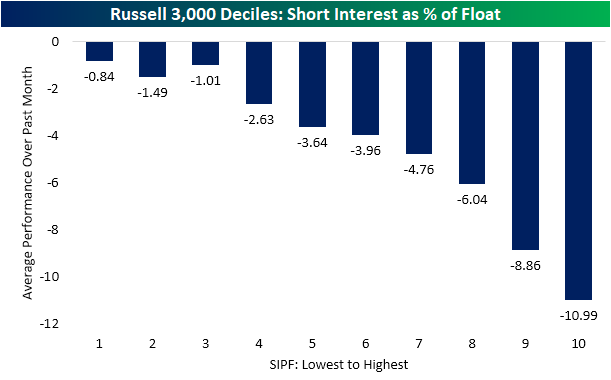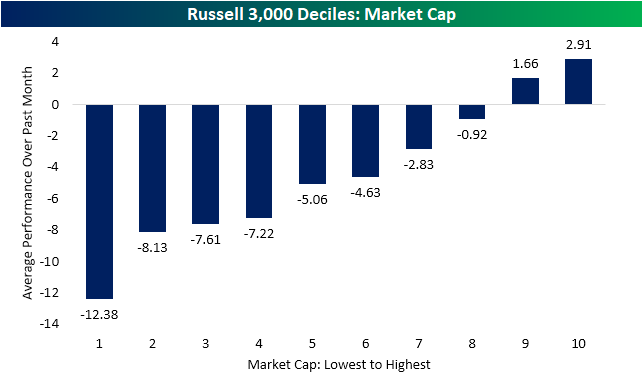Short Interest Through The End Of March
On Monday, short interest data through the end of March was released. ln aggregate for Russell 3,000 stocks, short interest as a percent of equity float is little changed versus where it stood in mid-March. But on an industry basis, there have been some large moves. Compared to midway through last month (red dashes in the chart below), the Pharma, Biotech, and Life Sciences industry saw short interest build by the most rising 0.68 percentage points. Of the other industries, there were eight that also saw higher short interest than the prior report. Conversely, the Telecom Services industry saw short interest fall the most of any sector dropping 0.46 percentage points between reports. While the moves between the most recent and the prior report were not very large, across the board, just about every industry has significantly lower average short interest levels now than at the start of the year (green dashes). That is especially the case for Retailing which has seen average short interest fall by 4.89 percentage points.

Earlier in the year, short interest appeared to be a key driver of performance. During the GameStop (GME) saga, the most heavily shorted stocks were some of the best performers. Fortunately for short-sellers, over the past month, the opposite has been the case. The stocks that had the highest short interest as a percent of float at the end of March have averaged a decline of 10.99% over the past month. Comparatively, stocks with low short interest have fared much better albeit still lower on average.
We would also note that while every decile based on short interest has averaged a decline over the past month, the Russell 3,000 has actually pushed to new highs. That is because the largest stocks by market cap have been driving the capitalization-weighted index higher.

In fact, one other notable theme of performance recently has been market cap. The deciles of the largest stocks (deciles 9 and 10) are the only ones whose stocks have averaged a move higher over the past month. On the other hand, the other deciles have averaged declines with the severity of those declines getting worse with smaller market caps.

In the table below, we show the 30 most heavily shorted stocks in the Russell 3,000 at the end of March. Health Care stocks, namely those of the Pharma, Biotech, and Life Sciences industry, dominate this list. That includes IGM Biosciences (IGMS) which is the most heavily shorted stock with 44.8% of shares shorted. Of the other top 30 most shorted stocks, 25 have at least a quarter of their shares sold short. Some of these like Academy Sports & Outdoors (ASO) and Gogo (GOGO) have that high short interest in spite of big declines in short interest recently. Others like IGMS as well as Discovery (DISCA), Frequency Therapeutics (FREQ), and Rackspace Technology (RXT) have seen short interest rise considerably.

In fact, those names are the stocks in the Russell 3,000 that have seen short interest rise the most versus the last report. RTX, IGMS, FREQ, as well as SeaChange International (SEAC), and iTeos Therapeutics (ITOS) have all seen a short interest rise by double-digit percentage points. There is an even larger number of stocks that have seen short interest fall double-digit percentage points, though, with Sumo Logic (SUMO) having seen the biggest decline falling 32.07 percentage points. Lastly, while the majority of stocks with high short interest or big increases/decreases in short interest are smaller in size, two standouts are Discovery (DISCA) and Rocket (RKT) with market caps of $26.57 billion and $45.6 billion, respectively.

Disclaimer: To begin receiving both our technical and fundamental analysis of the natural gas market on a daily basis, and view our various models breaking down weather by natural gas demand ...
more


